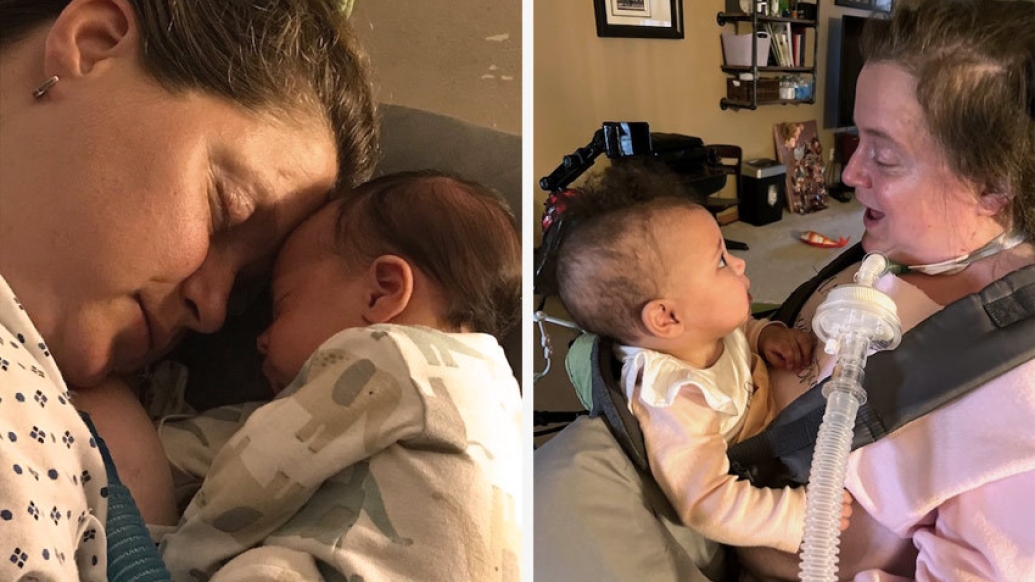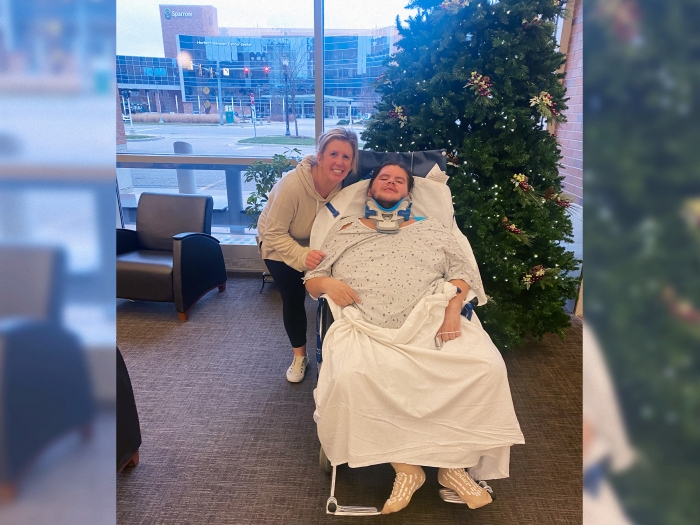A new mother with quadriplegia reflects on what she thought was an impossible dream of growing her family.
5:00 AM
Author |

It was a major car accident when Jill Pettway was eight years old that led to her extensive spinal cord injury and consequential quadriplegia, a paralysis of the arms, chest and legs.
"My husband and I wanted to have children one day but we were nervous about what it would be like to become pregnant and give birth after the accident," Pettway recalled. "We looked into the foster care system but it wasn't working out for us, and we ended up walked away from the possibility of parenthood altogether."
She told herself that she'd leave motherhood up to God.
Then, a few years later in early 2021, Pettway missed her period. The positive pregnancy test that followed left the couple in shock.
In particular, she was most nervous about her autonomic dysreflexia, a syndrome in which there is a sudden onset of excessively high blood pressure. The condition is common in those that have significant spinal cord injuries and the overreaction of the nervous system can be brought on by the slightest stimuli.
Considering how a person's body has to adjust to the ever-changing physical and emotional challenges of a nine month pregnancy, Pettway and her care team at University of Michigan Health Von Voigtlander Women's Hospital were rightfully concerned about the potential outcomes.
But despite all the odds, including a premature water breaking that resulted in an early delivery, Pettway gave birth to Londyn, a healthy baby girl who's now home and thriving.
With her first Mother's Day just around the corner, Pettway recounts the worrisome pregnancy and birth experience, discussing her favorite moments of motherhood and offering advice for first-time moms.
A birth plan
When Pettway found out she was pregnant that Saturday night, she decided to go about her life as she normally did since she wasn't sure she'd be able to carry the baby to full-term. She didn't want to create commotion around the pregnancy.
"I remember the next morning I went to church, bought some pre-natal vitamins and kept the pregnancy relatively hush," she said. "I told my caregivers, parents and siblings…but that was the extent of communicating the pregnancy."
Since Pettway had been a patient at University of Michigan Health since her car accident, it made sense to her to seek out her prenatal care at U-M Health
Molly Stout, M.D., M.S., the division chief for Maternal Fetal Medicine in the Department of Obstetrics and Gynecology, and Patricia Greco, M.D., obstetrician-gynecologist specializing in complex maternal disease and pregnancy management, had their concerns about how to give Pettway the best chance at a healthy pregnancy and birth.
"We were worried she wouldn't make it to the third trimester," Greco recounted. "It goes to show that women who worry about a complicated pregnancy or birth, no matter how many odds are stacked against them, can be hopeful."
Now I have my own daughter and I'm so excited to do everyday life together as a family.Jill Pettway
Both Stout and Greco worked with Pettway on a birth plan that would involve delivery at 34 weeks. The care team knew the soon-to-be mom shouldn't go into labor on her own since it would be a stressful experience for both her and the baby.
"We've seen patients with quadriplegia before but Jill's complications were more pronounced," Greco said. "She has a tracheostomy. This carries more complexities with coordinating her care."
Of equal concern, Pettway's medical history includes multiple, extensive urologic surgeries, so delivering a child increases the risk of injury to her reconstruction.
Leading up to the scheduled delivery date of September 27 (34 weeks pregnant), Stout and Greco worked together with respiratory and urologic experts at U-M Health to discuss the steps that would need to be taken during the impending delivery.
Sometimes, though, life doesn't go as planned and Pettway's water broke prematurely at 32 weeks.
"We typically don't deliver a baby for preterm premature rupture of membranes at less than 34 weeks right away unless there's concern of infection, the mom is in labor or we have fetal concerns," Greco said. "However, I was working when Jill came in and we decided to proceed that day with a Cesarean section. We discussed that it would be safer to proceed with a controlled delivery upon admission rather than risk the potential for an emergent delivery if maternal or fetal concerns developed while waiting until the typical 'goal' gestational age for delivery."
"I remember I was so upset," Pettway recalled. "This wasn't the plan. It was too early. I was anxious that my baby would have respiratory issues. But my care team was ready for me."
According to Greco, the team had to move urgently but not emergently. With urologic assistance, Pettway's cesarean section was performed on September 15 without any complications and Londyn Pettway was born at 4 pounds.
Despite needing to spend some time in the neonatal intensive care unit and use a naso-gastronomy tube to receive more nourishment, Londyn eventually would be able to go home and make great strides in her development.
Pettway's recovery was easier, getting discharged after only three days in the hospital.
"For a typical patient post cesarean section, the goal is to be discharged home after two days, so given that Jill was able to be safely discharged after three days with these other significant complicating medical issues - that's really amazing," Greco said.
A daughter of her own
Pettway says her family feels complete and she couldn't feel more fortunate.
"She sleeps through the night and wakes up happy…We're so lucky," Pettway said. "She loves being held and being around our pets."
Pettway expressed the gratitude she feels to build a mother-daughter bond with Londyn in the same way her mother did with her when she was little.
"I've always been around children since I was young, helping take care of other people's children like they were my own," Pettway said. "Now I have my own daughter and I'm so excited to do everyday life together as a family.

Explore a variety of healthcare news & stories by visiting the Health Lab home page for more articles.

Department of Communication at Michigan Medicine
Want top health & research news weekly? Sign up for Health Lab’s newsletters today!





